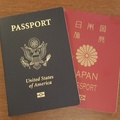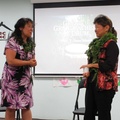So, I’m a little embarrassed to admit that I’ve paid virtually no attention to the immigration debate because I didn’t think it had anything to do with me. My mom’s parents emigrated from Okinawa to Hawaii before it was even a state, but they did so legally. My dad also came to the US legally. On the Hawaii side of my family, I’m the only one of my generation who wasn’t born in the US, but because my mom was a US citizen and she registered my birth abroad, I am technically not an immigrant—I automatically got US citizenship. I didn’t have to do anything for it. I did not realize how privileged that makes me.
After seeing Vincent Who? last month it seems the New England ADL automatically put me on their mailing list and a few weeks ago I got an invitation to a screening of Documented: a film by an illegal immigrant undocumented American. The trailer was captivating and Jose Antonio Vargas, the subject, writer, director, and producer of the film was going to be on hand for a Q&A so I went. I didn’t realize until the opening credits were rolling that Japanese American producer Kevin Iwashina (whose films I keep finding myself watching) co-executive produced the film!
Since Jose is a journalist, I had expected a newsy documentary with lots of facts and figures and arguments with his personal story as a backdrop, but instead the film was a deeply personal narrative about how he came to be in the United States illegally and what happened after he found out. When he was 12, his grandfather (who had immigrated to the US legally) arranged for a smuggler to bring him to the US so he could live with his grandparents and have a better life than he could back in the Philippines. When he was taken to the airport, he was told the man was his uncle. It would be another four years before he found out that his documents were fake. After that he found it easier to come out of the gay closet than the undocumented closet and he spent years mostly hiding his immigration status (sharing it with only a few trusted mentors) before eventually coming out in the New York Times Magazine at age 30. At the time he’d been living in the US for 18 years—more than half his life. The Philippines was no longer home. He considered himself an American but he had no papers to back that up. His only paths to citizenship would be to go back to the Philippines, wait ten years, then apply to come back to the US or marry an American, which was complicated by us not having equal marriage in all states and the federal government not recognizing those marriages at the time. Since DOMA was overturned, the federal government has begun to allow people in same gender relationships to sponsor their spouses. Jose told us after the film that he has 16 lawyers and they think that marrying a man might be the solution, but they’re not sure.
Jose is in a rare position. So far, ICE hasn’t tried to deport him. He acknowledged afterwards that he knows he’s the most privileged undocumented person in America. He’s educated. He has a lot of support. He has a high profile because he worked as a journalist for many years. He has a lot of connections (not too many undocumented Americans can say they know Mark Zuckerberg). He even won a Pulitzer Prize. He was quick to emphasize that his story is only one of millions, but it was a story he felt he should tell because he’s in a position to do so. Much of the film focuses on the difficulties he’s had with his mom who was left behind in the Philippines. He hasn’t seen her in person since he left and their relationship became strained over the years after Jose learned about her part in sending him here illegally and he was upset that she didn’t follow him as promised. He sent a crew to film his mom in the Philippines so you get to see both her perspective and Jose’s about what it’s been like for them to be separated all these years and the ups and down their relationship has gone through. Jose hoped that people would be able to connect with his story on a human level. Everyone understands family.
I was struck by Jose’s path to activism. In the film he talked about watching YouTube videos of young undocumented people who were speaking up as being “undocumented and unafraid.” He began to feel guilty. Here were people younger than he risking deportation to try and change things so that they and others in the same boat could get citizenship and stay in the country they call home. It reminded me a lot of why I came out. I watched a lot of “It Gets Better” videos on YouTube mainly from people younger than I, and I felt guilty. If they could be brave, why couldn’t I? During the Q&A, Jose said he saw parallels between the battles for LGBT rights and immigrant rights. He thinks immigration reform will go like LGBT rights—state by state. Equal marriage has only been possible because the culture shifted before the politics did. He believes that stories and art have the power to liberate people, which is why he made the film. For the past few years he’s been traveling the country showing the film and hoping to change the dialogue about illegal immigration, proving it’s never too late to become involved.
I wish the Q&A had been longer and better organized. We didn’t get to hear much from Jose because questions weren’t screened and most of the people who “asked questions” seemed to be more interested in hearing themselves talk than in hearing Jose speak. The last question was really excellent though. A young American man told Jose that his best friend was undocumented. His friend is smart and interested in politics but he’s feeling hopeless because right now he doesn’t see a way out of his situation or a way to achieve his goals. The young man wanted to know how he could encourage his friend. Jose commended him for being a great ally and said to pass on to his friend, “I just hope you don’t say ‘no’ to yourself.”
I would imagine that undocumented Japanese numbers are pretty low these days given overall Japanese immigration numbers are down (unfortunately I couldn’t find any stats), but certainly not all the Issei who came here back in the day came here legally. But that was a long time ago. Why should we care? I found a great piece on Racialicious—“Japanese Americans and Immigration: Where We Fit” that explains why it’s still relevant to Japanese Americans. It was written by Yonsei Kristin Fukushima a few years ago when she was Public Policy Coordinator for the Japanese American Citizens League Pacific Southwest District.
Until now “Documented” has only been shown at private screenings, but if you have cable, you can watch it on CNN. They snagged the US distribution rights and the film will air it on Saturday, July 5, 2014 at 9 p.m. and 11 p.m. ET. Details here.
If you’re not able to watch the film on CNN, they’re currently taking pre-orders for streaming or download on the film’s website.
*This article was originally published on the author’s blog, Japanese-American in Boston, on June 28, 2014.
© 2014 Keiko K.






